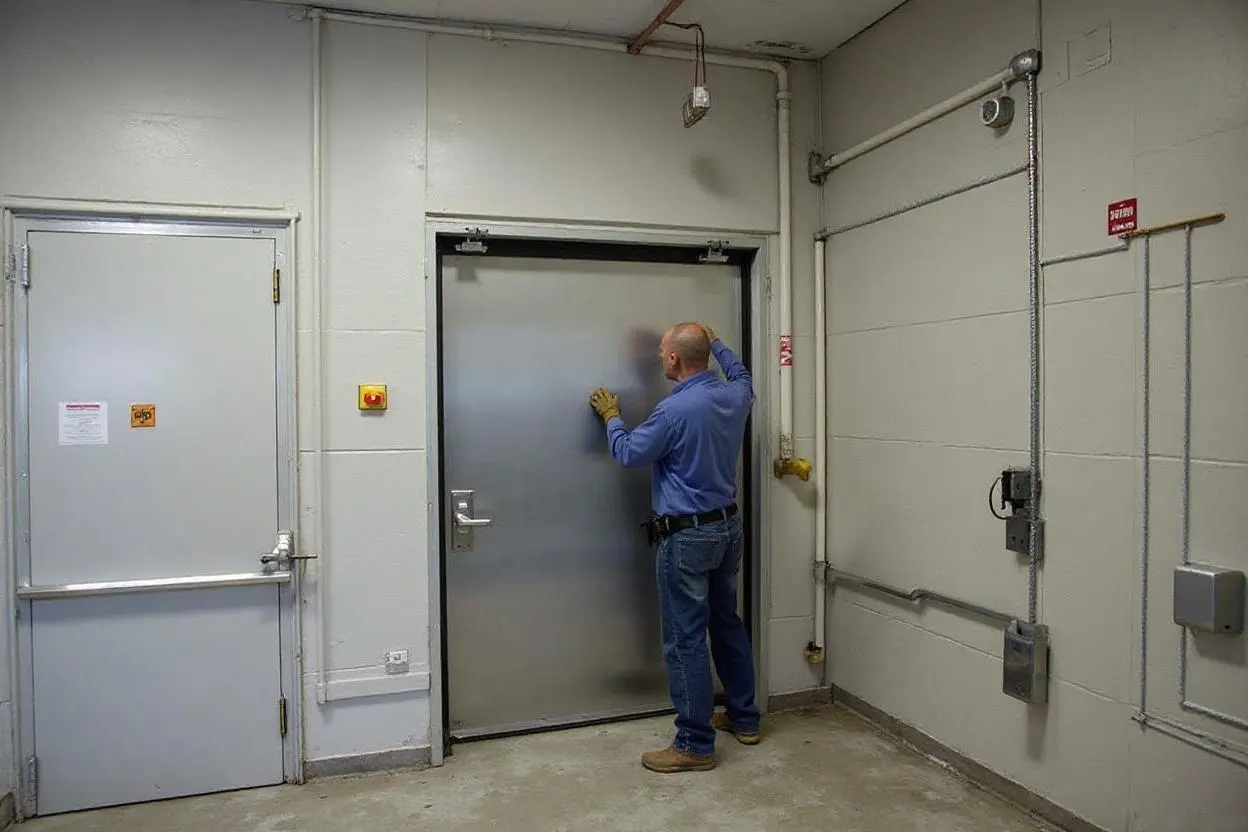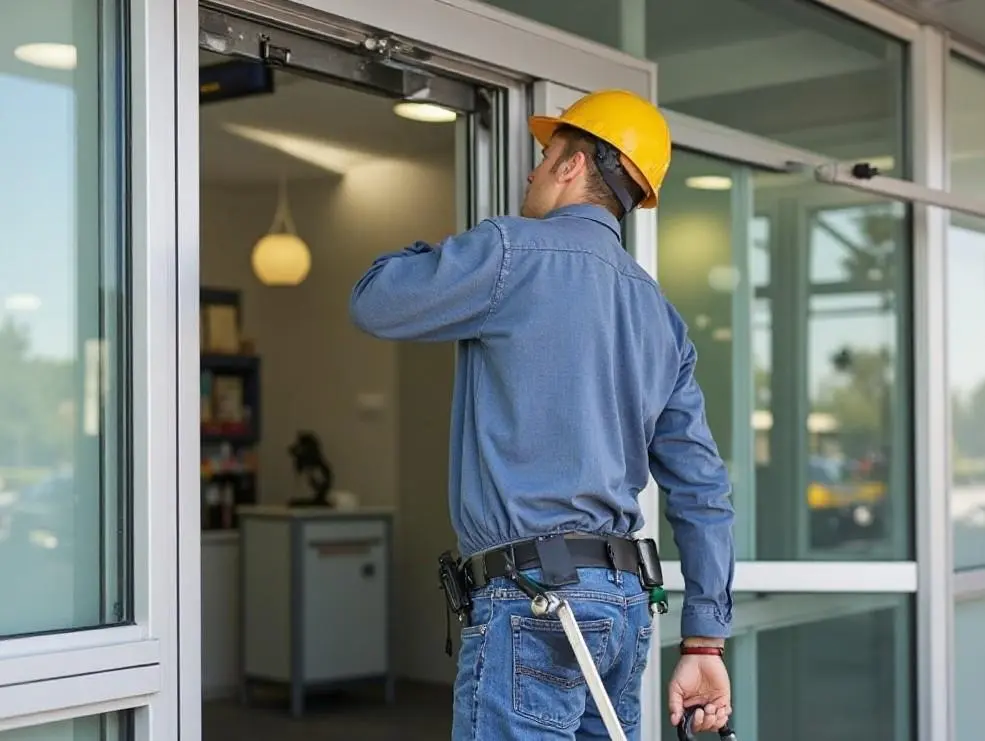Glass Panel Replacement for Sliding Automatic Doors in Buffalo: What You Should Know
Automatic sliding doors do a quiet job all day: they move traffic, hold heat in during a lake-effect cold snap, and keep lobbies bright. When a glass panel chips, fogs, or shatters, the system loses safety and efficiency. This guide explains how glass replacement works for sliding automatic doors in Buffalo, what affects cost and timing, and when it makes sense to repair hardware at the same time. It also shows how A-24 Hour Door National Inc. approaches automatic sliding doors repair Buffalo facility managers rely on in real weather.
How glass failures start
Most cracked panels start with small impact damage. A stock cart hits the stile, a snow broom catches a corner, or a door checks against a poorly placed floor mat. Cold snaps make minor flaws spread. Buffalo’s freeze-thaw cycles expand moisture in micro-cracks, which can turn a cosmetic chip into a running fracture overnight. Tempered glass tends to break in cubes after a hard hit. Laminated glass often shows a spider pattern but stays in the frame due to the interlayer. Both protect people, but the replacement path differs.
Another common issue is fogging or a milky edge on insulated glass units. Moisture intrusion into the spacer means the seal failed. In high-traffic grocery and healthcare entrances across Amherst, Cheektowaga, and North Buffalo, that often shows up first on the windward leaf.
Safety and code in Western New York
Entrance doors in commercial settings must use safety glazing. Tempered is common, laminated shows up in hospitals and schools, and many storefront sliders use insulated safety units. ANSI A156.10 governs automatic sliding door operation and sensors. ADA clear opening widths and smooth threshold transitions matter during replacement because changing glass thickness can affect reveal and sweep.
Buffalo inspectors often ask for safety logos on glass, correct rail heights, and documented sensor checks. A detailed service record from a technician familiar with local AHJ preferences saves re-inspection time.

Repair or replace the glass only?
If the door runs straight, sensors cover the approach, and the break is limited to the panel, a glass-only swap is efficient. If the glass failed after the door took a side hit, check for carrier damage, bent header track, or misaligned end stops. Replacing glass in a door with a bent stile invites repeat failure. A-24’s techs measure stile squareness and track wear before ordering glass so the new panel seats and seals correctly.
Glass types seen in Buffalo entrances
- Tempered single pane: common in interior sliders or mall corridors.
- Laminated safety: used where security or sound control matters, often paired with film.
- Insulated safety glass (IGU): best for exterior sliders on Elmwood, Delaware, and Transit Road, where heat loss matters.
- Low-E coated IGUs: reduce heat transfer and glare for south-facing doors.
Selecting the right build matters. A 1-inch IGU adds weight, which may exceed old operator specs. That is a good moment to assess motor torque and guide wheels.
What the replacement visit looks like
Technicians first secure the opening. If glass is unstable, they cordon off the approach and switch the operator to hold-open. Removal begins with deglazing: pop off caps or rails, cut sealant, then slide the broken unit free. Any shards are vacuumed from the sill and roller pockets. New glazing tape or setting blocks go in, sized for the glass thickness and stile profile. The new panel is set, squared to the head and threshold, and fastened per the manufacturer’s rail system. Weatherstripping and brush seals are checked and replaced if worn.
After re-glazing, the tech runs operational tests. That includes open/close speed, hold-open time, door weight check, safety sensor activation zones, and presence detection over the threshold. A daily safety check decal is updated so staff have a quick reference.
Timing and lead times in winter
In-stock tempered safety panels sliding doors for standard rail sizes are often available same-day or next-day. Custom IGUs with Low-E or tinted glass can take 3 to 7 business days, longer if the spec calls for custom spacers. During lake-effect weeks, many facilities request emergency board-ups. A-24 carries temporary panels and clear polycarbonate for same-day securements across Buffalo, Tonawanda, and West Seneca. Once the custom unit arrives, the final swap usually takes 1 to 2 hours per leaf.
Cost factors that move the needle
Glazing costs hinge on size, type, and access. A small tempered panel in a pharmacy slider differs from a tall insulated unit in a supermarket vestibule. Rail systems matter too: some require new clamp kits. Add-ons include new brush seals, bottom guides, and service time to correct track alignment. A practical range for commercial sliding door glass replacement runs from mid hundreds to low thousands per leaf. Emergency night or weekend service adds premium time but can prevent a closure that costs more.
Why operators and glass interact
Doors with tired rollers or dirty tracks make glass work harder. The panel shakes and micro-fractures at the fasteners. In Buffalo, salt grit collects in sills and chews through guides. Replacing glass without cleaning and re-lubing the track shortens the life of the new unit. The best automatic sliding doors repair Buffalo teams pair glazing with a quick operator service: adjust rollers, clean sensors, calibrate speeds, and verify learn cycles.
Weather, energy loss, and comfort
An IGU with Low-E coating reduces heat loss and cuts drafts at the entrance. It keeps lobbies calmer during Nor’easter gusts and helps compressors cycle less in summer. Stores on windy corners of Hertel Avenue report fewer cold complaints after upgrading to insulated safety units. The added weight may require stronger carriers, which a tech can confirm during measurement.
Security and after-hours operation
Glass choice affects security. Laminated glass holds together under impact and slows smash-and-grab attempts. Clear security film can be added to tempered units but does not replace the interlayer of laminated glass. If a business runs after midnight, pairing laminated glass with reliable presence sensors prevents nuisance alarms and keeps doors safe for late-shift traffic.
What property managers can check weekly
- Watch the door run. A smooth glide with even gaps means the frame is square and rollers are healthy.
- Look at the edges of the glass. Chips at corners grow fast in cold snaps.
- Listen for scraping at the sill. That often means a worn guide or debris in the track.
- Test approach sensors with a slow walk and a cart. The door should open early and stay open while occupied.
- Inspect weatherstrips. Frayed brushes leak heat and collect salt.
These quick checks catch problems before they break budgets.
Insurance, liability, and documentation
Most glass impact claims involve a clear incident, like a cart strike. Photos of the scene, the broken panel, and the surrounding floor help. A-24 provides service reports with measurements, glass type, and sensor tests, which property insurers and risk managers accept as proof of corrective action. If an injury occurred, ANSI and ADA references in the report matter.

How A-24 approaches measurement and ordering
The tech measures visible daylight, rail bite, and overall panel weight targets. For IGUs, spacer thickness and Low-E surface are noted. Stamp requirements for safety logos are confirmed with the client’s compliance team. When replacing one of a pair of bi-parting doors, matching tint and reflectivity helps the entrance look consistent. If a building plans a future storefront upgrade in the Elmwood Village or South Buffalo, A-24 can spec glass that won’t limit later header or operator changes.
Common edge cases in Buffalo buildings
Historic storefronts along Main Street sometimes have non-standard stile profiles. In those cases, a custom adapter or rail kit is the right move. Medical facilities in the Medical Campus area prefer laminated IGUs for sound control and security. Grocery vestibules with heaters above the header can create thermal stress on single panes; insulated units reduce that risk. In transit-adjacent sites near the NFTA stations, wind load on exposed entrances pushes for thicker IGUs and firm end stops.
When repair beats replacement
Not all star cracks require a full panel swap. Small chips on tempered glass that sit outside the sweep area and away from hardware may be monitored, though few facilities accept the risk. Fogged IGUs cannot be re-sealed reliably on site, so replacement is the practical route. If a panel scratches but stays clear, a buff may help, but deep scratches near safety logos are a replacement call.
Why local matters for automatic sliding doors repair Buffalo
Weather, salt, building stock, and inspector preferences shape good service. A Buffalo-based crew shows up fast during storms, carries parts that match local doors, and knows which glass fabricators can turn IGUs quickly. That keeps entrances open and safe, which matters for retail peaks and clinic schedules.
Ready to fix the glass and tune the door
A-24 Hour Door National Inc. handles full glass panel replacement, operator service, and safety sensor checks for sliding automatic doors across Buffalo, Amherst, Cheektowaga, West Seneca, Tonawanda, and nearby towns. Same-day securements are available, with most standard tempered panels replaced within 24 hours and custom IGUs in a few days. For dependable automatic sliding doors repair Buffalo businesses can schedule on their terms, call to set an on-site assessment. A short visit today prevents a bigger shutdown tomorrow.
A-24 Hour Door National Inc provides commercial and residential door repair in Buffalo, NY. Our technicians service and replace a wide range of entry systems, including automatic business doors, hollow metal frames, storefront entrances, fire-rated steel and wood doors, and both sectional and rolling steel garage doors. We’re available 24/7, including holidays, to deliver emergency repairs and keep your property secure. Our service trucks arrive fully stocked with hardware, tools, and replacement parts to minimize downtime and restore safe, reliable access. Whether you need a new door installed or fast repair to get your business back up and running, our team is ready to help. A-24 Hour Door National Inc
344 Sycamore St Phone: (716) 894-2000 Website: https://a24hour.biz/buffalo
Instagram: @a24hourdoor
Buffalo,
NY
14204,
USA
Facebook: 24 Hour Door
Yelp: A-24 Hour Door National (Buffalo)
X (Twitter): @a24hrdoor